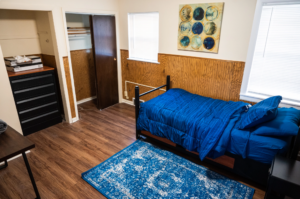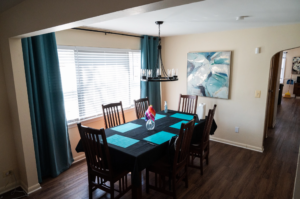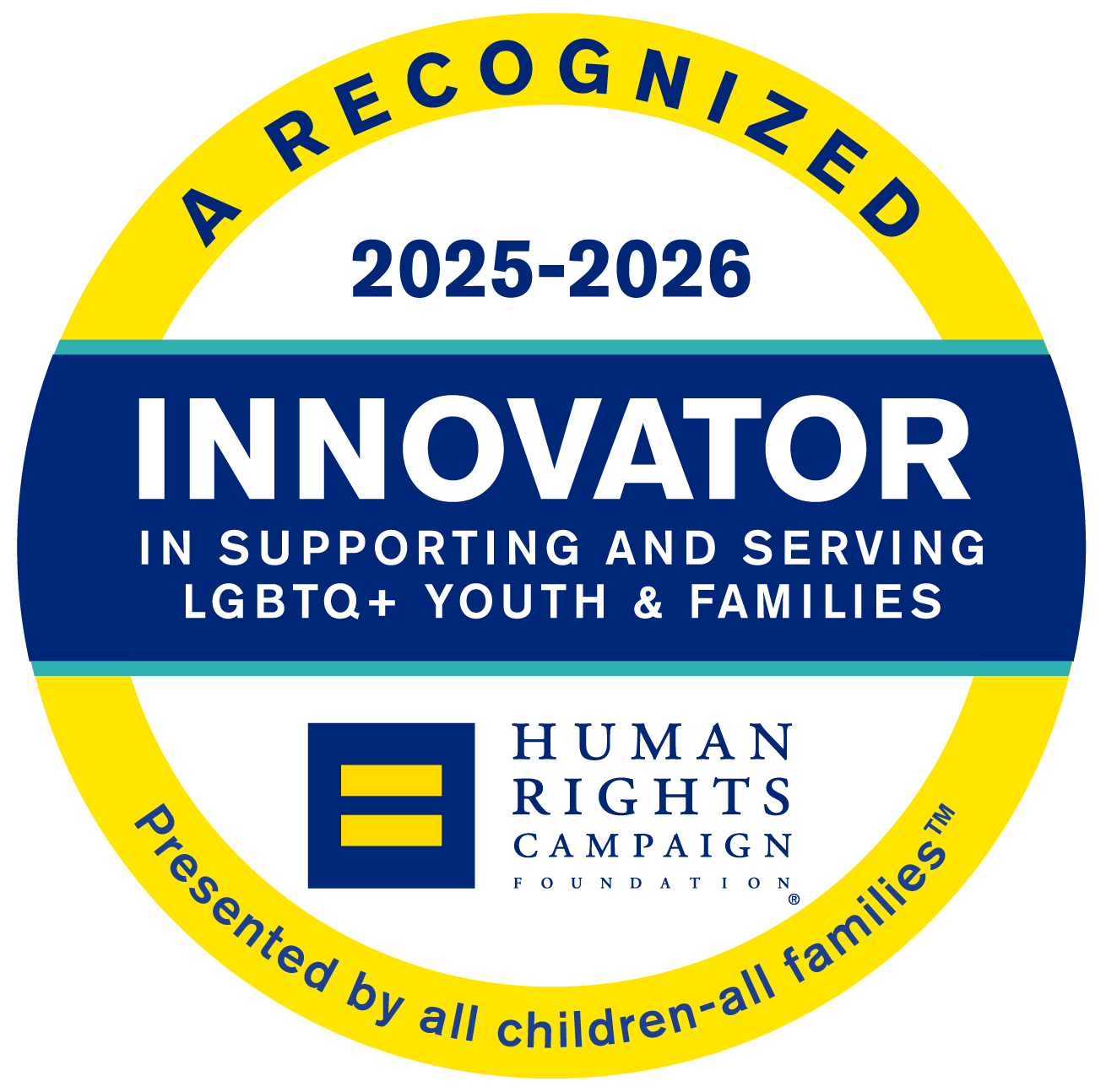At Lawrence Hall In Albany Park, LGBTQ+ Youth Find Housing — And A Support System
Lawrence Hall has spent decades helping young people overcome childhood trauma. The new housing comes as discrimination and violence against LGBTQ+ people is rising, advocates say.
By Alex V. Hernandez, Block Club Chicago

Credit: Colin Boyle/Block Club Chicago
Lawrence Hall’s LGBTQ+ transitional home in Albany Park is seen on April 12, 2023.
Editor’s note: This story mentions self-harm and suicide.
ALBANY PARK — An Albany Park nonprofit specializing in helping young people heal from childhood trauma has opened a transitional home for young, queer people to build skills to live as independent adults.
Lawrence Hall’s new facility, 15 minutes from the organization’s main campus, 4833 N. Francisco Ave., welcomed its first young resident in March. It’s now at capacity, housing five young LGBTQ+ people between 17 and 20 years of age.
For the safety of the residents, Block Club is not disclosing the address.
Lawrence Hall was created shortly after the end of the American Civil War to help orphaned children in Chicago. It serves more than 1,400 youth and families in and around Chicago every year.
The plan for the LGBTQ+ youth home has been years in the making, said Pavielle Randolph, Lawrence Hall’s site coordinator.
“This is to provide a safe space for LGBTQ youth where they feel validated, feel affirmed and where they feel cared about,” Randolph said. “We noticed there was just a lack of services in our communities, especially around LGBTQ youth homelessness.”

Credit: Colin Boyle/Block Club Chicago
A bedroom at Lawrence Hall’s LGBTQ+ transitional home in Albany Park.
The new housing comes at a time when LGBTQ+ rights are being restricted and queer people are increasingly threatened with physical violence, according to the Southern Poverty Law Center.
Ald. Rossana Rodriguez-Sanchez (33rd), who identifies as queer and whose ward includes the nonprofit, said Lawrence Hall’s broadened effort to support young people gives her hope amidst the national backdrop of anti-LGBTQ+ rhetoric.
“We see what’s happening in our country, and I think the underlying issue is white supremacy. We’re seeing anti-immigrant hate and hate against trans and queer people. But we have decided that Chicago is a sanctuary city and we’re acting accordingly,” Rodriguez-Sanchez said. “I’m super excited to see how this initiative grows.”
One of the residents, Steve, 18, said living among other LGBTQ+ young people is helping him slowly build trusting relationships after spending years in the state’s foster system.
“I feel like if I was at a queer home sooner, I could have at least made friends with people I can trust,” Steve said. “Since everybody’s in the LGBTQ community here, we have more in common than with straight people. And I feel like that’s a good thing.”
Life At The Youth Home

Credit: Colin Boyle/Block Club Chicago
The kitchen at Lawrence Hall’s transitional home.
The program at Lawrence Hall is based out of a two-story single family home with five bedrooms, two bathrooms and common areas like a kitchen and living room as well as a basement used for storage, Randolph said.
The youth must strike out on their own after they turn 21, Randolph said.
Some residents are still in high school while others have graduated and are working or considering going to college, so the daily activity at the house is fluid, Randolph said. Lawrence Hall staff comes and goes to monitor the youths, who have daily and weekly chores they’re responsible for, Randolph said.
“We try to teach them not only individual skills for living by themselves but also to respect their shared living spaces, others’ space and how to commune with other people,” Randolph said. “Because sometimes as a teenager, you just want to go go go. But you have responsibilities you have to take care of first that you have to prioritize before you have fun. So it’s also teaching them that.”
Lawrence Hall staffers help residents move in when they arrive, Randolph said. Most of the furniture like beds, TVs, desks and dressers are provided by the organization, and the residents can take that furniture with them when they move into their own apartments, Randolph said.
The residents also get an allowance, which can cover clothes, cell phone bills, gas and regular car maintenance or CTA passes, Randolph said. They have a 12 a.m. curfew, but otherwise they can come and go as they please, Randolph said.

Credit: Colin Boyle/Block Club Chicago
A common space.

Credit: Colin Boyle/Block Club Chicago
The dining room.
Other offerings include job training, job interview preparation, post-secondary education options, budgeting their money, using public transit and other life skills needed to live independently and be productive in society, Randolph said.
“If someone says, “Hey, I don’t have gas for my car or money to get on the bus, but I need to go to X, Y and Z.’ That’s where staff comes in and is able to take them,” Randolph said.
Staff also connects young people to other LGBTQ+-affirming organizations, Randolph said.
“This is especially important depending on where the youths are coming from,” Randolph said. A lot of times we have youth that are coming from very rural areas, like central Illinois. So although they may be within the queer community, they might have never experienced a queer person outside of themselves,” Randolph said.
More than half of the staff at Lawrence Hall’s new home are LGBTQ+ people, Randolph said.
“I’m a firm believer that a child can’t be what they can’t see. So it’s important to have positive influences within your community that are doing these great things, showing you that you don’t have to be ashamed. You don’t have to feel less than or unworthy,” Randolph said.

Credit: Colin Boyle/Block Club Chicago
An art piece at the transitional home.
How Homelessness Affects LGBTQ+ Youth
LGBTQ+ youth face significantly higher rates of homelessness and housing insecurity than non-queer youths, according to the National Coalition for the Homeless and The Trevor Project.
Around 28 percent of LGBTQ+ youth reported experiencing homelessness or housing insecurity in their lives, with the rates even higher among queer youth of color, according to a 2022 Trevor Project report. Those who have struggled to find safe and stable housing also had much higher risk of depression, anxiety, self-harm and suicidal ideations, according to the report.
Reyna Ortiz, a program director at TaskForce Chicago, has seen this dynamic play out first hand. The group has supported LGBTQ+ youth of color for the past 30 years,
A home environment where parents or caregivers are homophobic or transphobic typically means queer youth are either kicked out of their home or ran away from the toxic environment at a very young age, she said.
“And then once they’re out on the street, they’re susceptible to violence, suicide, to HIV infection and people, adults, preying on them,” Ortiz said. “When I see a kid come into my space and they’re young I’m like, ‘Oh my god. What happened?’ The majority of time they come from broken homes or their families weren’t accepting of their identity.”
A 2022 national survey from The Trevor Project showed found LGBTQ+ youth living in accepting communities reported significantly lower rates of attempting suicide compared to those who did not.
“Throwing your child into the street only causes such severe levels of trauma. And it really damages and wounds them,” Ortiz said. “We try to assist them, but they carry that wound with them everywhere they go. It’s so heartbreaking to witness.”

Credit: Colin Boyle/Block Club Chicago
A dining room.
Teens living at the home told Block Club they were happy to be among other young LGBTQ+ people. The environment helps them feel safe, be themselves and make friends more easily, they said.
Steve, originally from the south suburbs, entered foster care when he was 12 because his mother struggled substance use disorder, he said. His case worker told him about Lawrence Hall when he turned 18 and aged out of foster care, he said.
Since moving in at the end of April, Steve has befriended the other teens living there, frequently going out as a group to run errands, buy groceries or just hang out, he said.
“My case worker told me this place would have resources for me to help me grow. And honestly, I feel like the staff is good staff. I wouldn’t say I have one staff here that I don’t like,” Steve said.
While the living situation is an improvement for the teens, they still have challenges.
Steve used to keep a taser for protection when he lived in foster homes, but Lawrence Hall staff confiscated that and other weapons when the teens moved in, they said.
“If we have a problem … the staff will come right outside and help. That’s not the problem, and I don’t have any problems with staff, per se,” Steve said. “But when I’m outside of here without my taser, I can’t protect myself in any kind of way. … A lot of us are scared to walk outside.”
But overall, the home is working for the teens, they said. Steve said he wants to move out next year and is eagerly thinking about his future.
“I feel like this is the summer for me to unwind and think about my business plan. I’ve been doing Uber, DoorDash and things like that to save my own money here and there, but those aren’t guaranteed jobs,” Steve said. “I want to start my own business, and I need to sit down and figure out a business plan this summer and have it done by the time autumn comes.”
This article was originally published on Block Club Chicago and can be found here.
Search
Categories
- Blog (17)
- Grants and Awards (5)
- News (77)
Lawrence Hall is a 501(c)(3) organization. Gifts are deductible to the full extent allowable under IRS regulations.
©2025 Lawrence Hall All rights reserved. Site Construction by WorkSite









